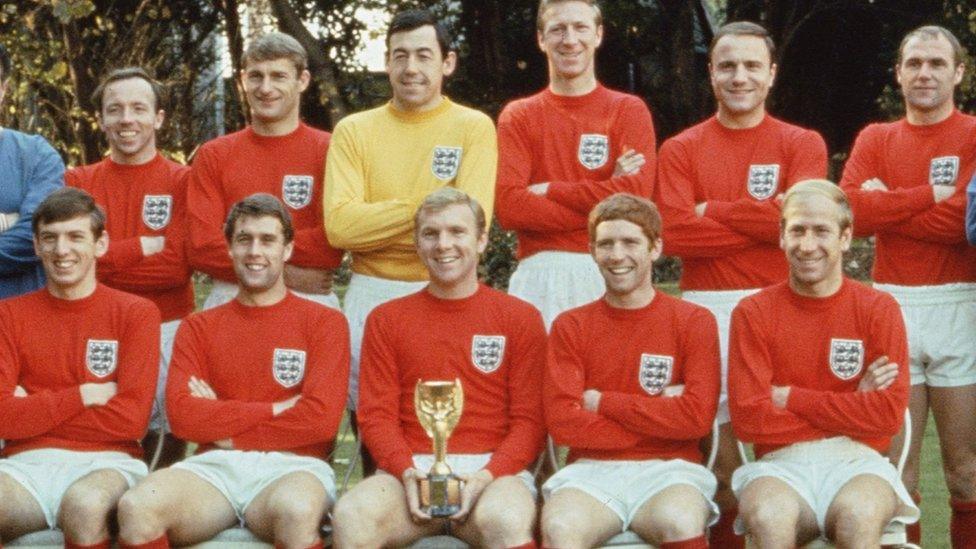'250 more' footballers with degenerative brain disease
- Published

Three of England's 1966 World Cup players - Nobby Stiles (back row, far left), Martin Peters (bottom row, far left) and Ray Wilson (back row, far right) - have been diagnosed with Alzheimer's
The family of footballer Jeff Astle - who died from brain trauma caused by heading footballs - say they know of 250 more players who have suffered from degenerative brain disease.
The striker's daughter Dawn Astle said she was not surprised by the revelation that three members of England's 1966 World Cup squad have Alzheimer's.
The family has pushed for research through the Justice for Jeff campaign.
The FA wants Fifa to probe a possible link between dementia and football.
"Any research and study done into the possible implications of heading footballs clearly has to be a good thing," said Miss Astle.
"But they could have done all this 14 years ago, when they had the coroner's verdict for my dad. 14 years is a damn long time."

Jeff Astle, from Eastwood in Nottinghamshire, played for Notts County, West Bromwich Albion and England
Since starting the Justice for Jeff campaign in April 2014, Miss Astle said she had been contacted by families of other footballers with degenerative brain disease, as well as "staunch supporters" of clubs.
"There's got to be about 250 [former players] that I know of. Not all of the families have come forward and some of the players have passed away," she said.
One family that did get in touch was that of a 1966 World Cup player, but they did not want his illness to be known to the public at the time.
'Very big iceberg'
"It's great that these iconic players and legends in the game have come out, very bravely, and their families have spoken about the suffering they are in now, but it doesn't just affect household names," said Miss Astle.
"We've had contact from many, many players, many of whom I'd never heard of, but they all matter."
The family said they had also been told about players having degenerative brain disease through people associated with football clubs.
"I think it is the tip of a very big iceberg, sadly. I wish it wasn't but I think it is," said Miss Astle.


Jeff Astle's family has been pushing for research about the link between heading footballs and brain trauma
Ex-England, Notts County and West Brom striker Jeff Astle died aged 59 in 2002, when his degenerative brain disease caused him to choke to death on some food
He had been diagnosed with early onset Alzheimer's, but a doctor who examined his preserved brain in 2014 said he had chronic traumatic encephalopathy (CTE) - a condition normally linked to boxers
An inquest in 2002 found that repeatedly heading heavy leather footballs had caused trauma to his brain, and the corner recorded a verdict of death by industrial disease
His family started the Justice for Jeff campaign in 2014 and The Jeff Astle Foundation, external in April 2015, which aims to raise awareness of brain injury in all forms of sport
Dawn Astle said her father would not have wanted heading to be banned, but wants players to make an informed choice

She said about 95% of the players affected have Alzheimer's disease or had it before they died, while the rest have had other degenerative brain diseases.
Miss Astle's father played with heavy leather footballs but she said she was concerned for modern-day footballers.
"How it was described to me is the balls nowadays are much lighter but they travel faster, and sometimes players are much stronger and hit it harder," she said.
"It's down to the pure physics of something striking the head and the brain being rocked backwards and forwards in the skull.
"I hope to God that there isn't a link with the modern day ball but I would be very, very surprised if the safety implications aren't the same."
- Attribution
- Published9 April 2016

- Published11 April 2015

- Published1 June 2014

- Published3 April 2014

- Published25 March 2014
